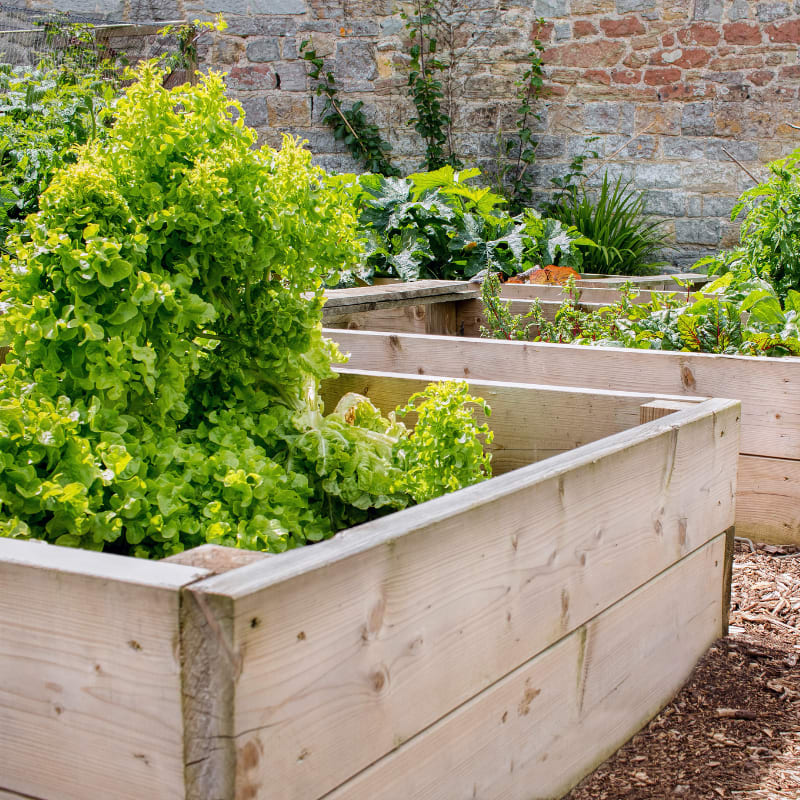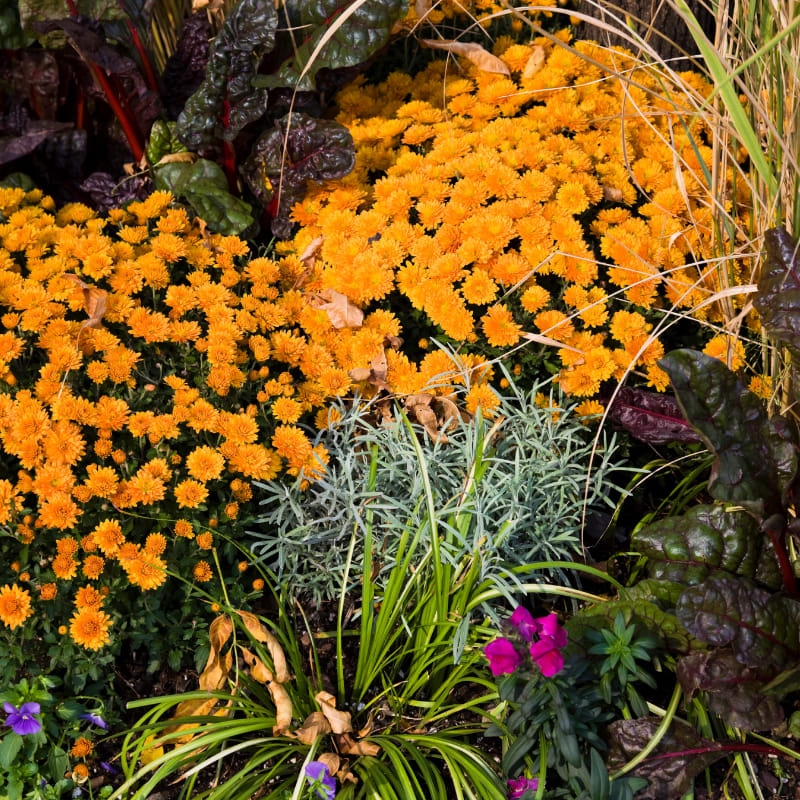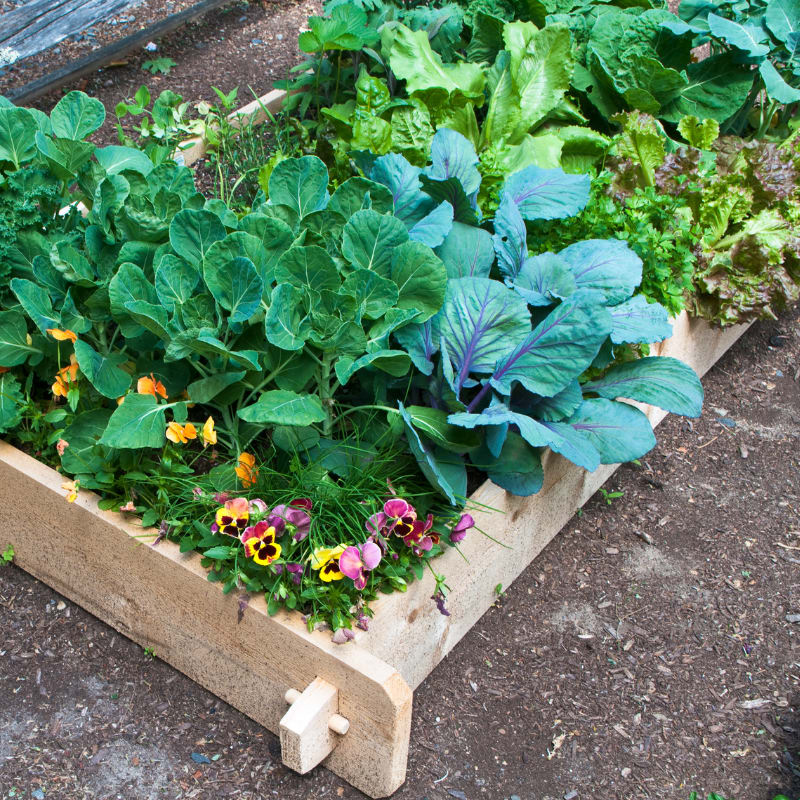Right now, you may be planting your fall garden. You can pick the perfect plants for your location, have the perfect soil amendments to supplement plant growth and even the perfect, cute little planters… but what about the perfect pH? What is the pH of your soil, and should you pay attention to it? Do products like aluminum sulfate or agricultural lime really do anything for your garden soil? What is the effect of soil pH on plants?
What is Soil pH?
Technically, it is the measurement of the hydrogen ion concentration. Basically, pH is a measure of how acidic or alkaline your soil is. The pH scale ranges 1 to 14. If your soil has a pH value of less than 7, then you have acidic soil. On the other hand, if your soil has a pH value of greater than 7, then you have alkaline soil. A pH value of 7 is neutral, meaning you have neither acidic nor alkaline soil.
pH Scale
Below is a scale we made to illustrate the soil acidity spectrum. Soil pH ranges from 0 to 14, with 7 being perfectly neutral soil.

The Effect of Soil pH on Plant Growth
Soil properties greatly impact the type and amount of essential nutrients available to plant roots. Each plant has its own recommended pH value range. The reason for this is that pH affects the availability of nutrients within the soil, and plants have different nutrient needs. For example: The nutrient nitrogen, a very important plant nutrient, is readily available in soil when the pH value is above 5.5. Consequently nitrogen may turn into gas with a pH value above 7.2 Similarly, the nutrient phosphorus is available when the pH value is between 6 and 7. If a plant is placed into the wrong kind of soil, it will be lacking in nutrients that it needs, which will promote disease. In general, the best pH value range for soil is approximately 6 or 7. This is the range in which most nutrients can be readily available. So you can remember that the value in range supplies essential plant nutrients and is one of the major factors affecting soil.
Finding Out pH of Soil
Finding out the pH of soil is usually easy, with soil test kits available at most good garden centers. Usually a pH test kit will include a small container or test tube, a testing solution and a color chart. A sample of soil is taken from your garden, placed into the test tube and a few drops of testing solution are added. The container is then shaken and left for a certain period of time. The color of the sample in the container is then compared against the color chart to determine the pH value of the soil. In most areas, you can take your sample to your County Extension agent for them to conduct a soil test, too.
Lawn and Garden Products to Improve Plant Health
While maintaining the recommended pH is important to soil and plant health, adding all-natural lawn and garden products can further improve the health of your soil, and thus, the health of your plants.
Our all-natural soil amendments add beneficial microbiology to the soil to make nutrients more readily available to plants.
Learn more about our all-natural lawn and garden products.
How to Make Alkaline Soil (Increase pH):

You can neutralize soil acidity (increase its pH value) by adding a form of lime. Lime is a compound of calcium, or calcium and magnesium, otherwise known as pure calcium carbonate. It is usually applied in the form of ground agricultural lime, burnt lime or hydrated lime (slated lime). The smaller the limestone particles, like in finely pelletized lime, the quicker your soil will become more alkaline. For this reason, hydrated lime will offer the quickest performance if you want to raise the soil pH. It is slightly soluble in water, so it can permeate the soil quicker and reduce acidity faster.
Increasing your soil's pH is not an overnight process, and it is best to allow 2-3 months to allow the lime/calcium carbonate to neutralize the acidity of the soil.
How to Make Soil More Acidic (Decrease pH)
Some ornamental plants and fruit plants like blueberries require an acidic soil. To increase soil acidity (decrease the pH value) you can use either ammonium sulfate or sulfur. Ammonium sulfate and ammonium nitrate are fertilizers, and with continued use they will increase acidity as they dissolve into the soil. You can buy aluminum sulfate for garden soil at most lawn and garden stores. The downsides are that their effects can be short term and it is possible to over-apply them.
The more recommended but slower way to increase your soil pH is to use sulfur. Elemental sulfur converts to sulfuric acid with the help of bacteria in the soil, but this takes time depending on factors like the presence of bacteria, texture of the soil and moisture levels. This could take months if conditions are not ideal.
How can I make soil more acidic organically?
A lower pH level helps certain plants absorb nutrients efficiently from the soil. If the soil acidity is too high for plants it is bad for establishing healthy gardens. Organic soil acidification methods have been useful in lowering soil pH in gardens. There is a solution for making the soil more acidic organically.
Water is often alkalinistic and limestone breaks down regularly in soil, thereby increasing alkalinity. However there are organic methods that have proved helpful at rendering the soil acidic. Many crops have alkaline soils that make it harder for plants to drink nutrients and which can prevent optimal growth.
pH Impacts Nutrients, Minerals and Growth
The effect of soil acidity is great on the solubility of minerals or nutrients and thus their availability to plant roots. Fourteen of the seventeen essential plant nutrients are obtained from the soil. Before a nutrient can be used by plants, it must be dissolved in the soil. Most minerals and nutrients are more soluble or available in soils with acidic pH values than in neutral or mildly alkaline soils.

Phosphorus is never readily soluble in the soil, but is most available in soil with a pH range centered on 6.5. Extremely acidic soils (pH 4.0-5.0) can have high concentrations of soluble aluminum, iron and manganese, which may be toxic to the growth of some plants. A pH range of approximately 6 to 7 promotes the most ready availability of plant nutrients.
But some plants, such as azaleas, rhododendrons, blueberries, white potatoes and conifer trees tolerate strong acid soil and grow well. Also, some plants do well only in slightly acidic to moderately alkaline soils. However, a slightly alkaline (pH 7.4-7.8) or higher pH soil can cause a problem with the availability of iron to some trees. This causes chlorosis (insufficient chlorophyll) of the leaves, which will put the tree under stress. This leads to tree decline and eventual mortality.
The soil pH can also influence plant growth by its effect on activity of beneficial microorganisms. Bacteria that decompose soil organic matter are hindered in strong acid soil. This prevents it from breaking down, resulting in an accumulation and the tying up of nutrients, particularly nitrogen, that are held in the organic matter.
Changes in Soil pH
Soils tend to become acidic as a result of: (1) rainwater leaching away basic ions (calcium, magnesium, potassium and sodium); (2) carbon dioxide decomposing and root respiration dissolving in soil water to form a weak organic acid; (3) formation of strong organic and inorganic acids, such as nitric and sulfuric acid, from decaying organic matter and oxidation of ammonium and sulfur fertilizers. Strongly acidic soils are usually the result of these strong organic and inorganic acids.
Lime is usually added to acidic soils to increase soil pH. The addition of lime not only replaces hydrogen ions and raises soil pH, thereby eliminating most major problems associated with acid soils but it also provides two nutrients, calcium and magnesium, to the soil. Lime also makes phosphorus that is added to the soil more available for plant growth and increases the availability of nitrogen by hastening the decomposition. Liming materials are relatively inexpensive, comparatively mild to handle and leave no objectionable residues in the soil.
Some common liming materials are: (1) Calcic limestone, which is ground limestone; (2) Dolomitic limestone from ground limestone high in magnesium; and (3) Miscellaneous sources such as wood ash. The amount of lime to apply to correct a soil acidity problem is affected by a number of factors, including current soil pH, texture (amount of sand, silt and clay), structure and amount of organic matter. In addition to soil variables, the crops or plants to be grown influence the amount of lime needed.
Of course, you can always conduct a soil test to learn if your soil's pH level has changed over time, because of your addition of agricultural lime or elemental sulfur or due to an extreme weather event.
The Importance of Soil pH to Plant Nutrients
The pH of soil or, more precisely, the pH of the soil solution, is very important because it impacts nutrient availability. Soil carries nutrients such as Nitrogen (N), Potassium (K) and Phosphorus (P) that plants need in specific amounts to grow, thrive and fight off diseases.
If the pH of the soil is increased above 5.5, Nitrogen (in the form of nitrate) is made available to plants. Phosphorus, on the other hand, is available to plants when soil pH is between 6.0 and 7.0.
Certain bacteria help plants obtain N by converting atmospheric Nitrogen into a form of N that plants can use. These bacteria live in root nodules of legumes (like alfalfa and soybeans) and function best when the pH of the plant in which they live is growing in soil within an acceptable pH range.

For instance, alfalfa grows best in soils having a pH of 6.2 - 7.8, while soybean grows best in soils with a pH between 6.0 and 7.0. Peanuts grow best in soils that have a pH of 5.3 to 6.6. Many other crops, vegetables, flowers and shrubs, trees, weeds and fruit are pH dependent and rely on the soil to obtain nutrients.
If the soil solution is too acidic, plants cannot utilize N, P, K and other nutrients they need. In acidic soils, plants are more likely to take up toxic metals and some plants eventually die of toxicity (poisoning).
Herbicides, pesticides, fungicides and other chemicals are used on and around plants to fight off plant diseases and get rid of bugs that feed on plants and kill plants. Knowing whether the soil pH is acidic or basic is important because if the soil is too acidic, the applied pesticides, herbicides and fungicides will not be absorbed (or held in the soil) and they will end up in garden water and rainwater runoff, where they eventually become pollutants in our streams, rivers, lakes and groundwater.
Summary
You need to match up soil pH levels with the plants you are planning on growing for optimal plant health. Plants vary in what soil pH they prefer, so keep this in mind as you select plants. Conduct a soil test to accurately identify soil pH levels. You can select plants that prefer the pH level that occurs naturally in your soil, or you can take measures to alter the pH in your garden’s soil. Generally speaking, soil pH values of 6 to 7 work well because the main nutrients that most plants need can be made available in that range. Help your plants thrive in their soil by considering soil pH levels.
Contact Us
If you have any questions about soil pH or our all-natural lawn and garden products, reach out to us at success@southlandorganics.com or 800-608-3755. Remember to subscribe to our YouTube channel for more helpful lawn and garden information.
Related Websites
http://www.esf.edu/pubprog/brochure/soilph/soilph.htm
http://extension.msstate.edu/publications/soil-ph-and-fertilizers-0






